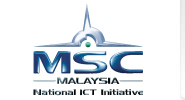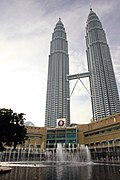Geographical definition
The MSC proper spans Petronas Towers in downtown Kuala Lumpur, extending through Cyberjaya, Putrajaya, the Kuala Lumpur International Airport and most of Sepang constituency, as well as parts of Bandar Tun Razak, Puchong and Serdang constituencies, before terminating at Nilai, Negeri Sembilan, which is part of the neighbouring Malaysia Vision Valley corridor.
The MSC also has an enclave within the Iskandar Malaysia corridor in the southern state of Johor, known as the MSC Cyberport, established in 2006.
Purpose
The MSC flagship applications were launched to boost the MSC Malaysia initiatives and to create a hub for innovative producers and users of multimedia technology. Consortia comprising local and foreign companies (MNCs) collaborated with government agencies, departments and ministries to enhance the socio-economic development of Malaysia in the information age. The vision and mission of the Multimedia Super Corridor (MSC) as expressed by Dr Mahathir Mohammad, the Prime Minister of Malaysia at the time (1981–2003), is essentially this:
MSC is paramount to leapfrog (Malaysia) into the 21st century and to achieve Malaysia's Vision 2020, the MSC was created to endeavour the best environment to harness the full potential of the multimedia without any artificial limits. MSC is a global test bed (hub), where the limits of the possible can be explored, and new ways of living, working, and playing in the new area of the Information Age. [3] [4] [5]
The Multimedia Super Corridor is a government-designated zone in designed to leapfrog Malaysia into the information and knowledge age. It aims to attract companies with temporary tax breaks and facilities such as high-speed Internet access and proximity to the Kuala Lumpur International Airport.
MSC Malaysia covers an area of approximately 15 km (9.3 mi) × 50 km (31 mi) (that is, 750 km2 (290 sq mi)) stretching from the Petronas Towers to the Kuala Lumpur International Airport, and including the towns of Putrajaya and Cyberjaya.
It was announced by former Prime Minister Mahathir Mohamad at the Multimedia Asia Conference on 1 August 1996. Mahathir's visit to the United States of America in January 1997 to promote the MSC to companies succeeded in attracting the interest of many large information technology companies. During the visit, an international advisory panel comprising 30 information technology experts were formed to exchange ideas toward the success of the MSC.
The Multimedia Development Corporation (MDeC, formerly MDC) was created to oversee development of the MSC. It was later renamed to Malaysia Digital Economy Corporation (MDEC).
This page is based on this
Wikipedia article Text is available under the
CC BY-SA 4.0 license; additional terms may apply.
Images, videos and audio are available under their respective licenses.






